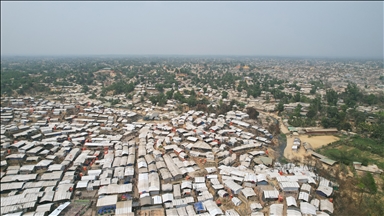
By Max Constant and Mainul Islam Khan
BANGKOK, Thailand
A Muslim Rohingya woman allegedly held captive and tortured in a Thai jungle camp has told local media that the last time she saw her child was when the chance came to escape.
"They said police were coming. Everybody ran. But I couldn't run because I was too sick to move," Rohima Khatun told the Bangkok Post on Tuesday.
As others fled from the camp, she continued to stumble down the mountain until local villagers found her.
I have no idea where my 10-year-old daughter is, she said.
The 25-year-old was discovered in Songkhla province, close to a camp where 26 bodies thought to be Rohingya and Bangladeshi trafficking victims were unearthed over the weekend.
Thailand has since been working to track down those responsible, while police said Tuesday that they had found another migrant grave site containing five graves.
Khatun told reporters that she been held in the camp for around four months before she managed to escape.
"I was beaten many times," she said from the Songkhla hospital where she is currently receiving medical care.
Khatun said she was taken from somewhere in Myanmar and detained in the jungle camp around four months ago.
She added that approximately 400 people were held in the camp, mostly Rohingya and Bangladeshis.
A Bangladeshi survivor from the camp discovered Friday has said that the people who run the camps demanded ransoms from their relatives, once they arrived on Thai shores.
He told Thai media from the same hospital where Khatun is being treated that he had been kidnapped in Cox’s Bazar, a coastal city in southern Bangladesh, and forced onto a boat with other Bangladeshis and some Rohingya.
He was then shipped to the camp in southern Thailand, where the smugglers told him to contact his family and tell them that they were to pay a ransom for his release.
"I was never able to contact them and ask them to pay," he told Phuketwan. "We were the people who could not pay the ransom so they kept us and did not really care whether we lived or died."
Speaking to The Anadolu Agency on Tuesday, a Bangladeshi coastguard commander said several months ago he had helped rescue a few hundred people being trafficked.
"They told us that traffickers collect people assuring them of jobs in Malaysia, but when they arrive in Thailand, traffickers trapped them and demanded high amounts to transport them to Malaysia," said Contingent Commander Kazi Fariduzzaman.
Chris Lewa, the director of the Arakan Project -- an NGO working on the plight of Muslim Rohingya for over a decade -- told AA on Sunday that the smuggling of Rohingya and Bangladeshis towards Malaysia through southern Thailand is a complex and ever-evolving process.
"We have found cases of people kidnapped, some in Bangladesh and some in Arakan," she told AA. Arakan is a region in western Myanmar where Muslim Rohingya and Buddhist Rakhine live.
Violence erupted between the two communities in June 2012, which forced many Rohingya to flee.
They paid smugglers to transport them on rickety boats across the Andaman Sea toward Thailand and Malaysia. Once there, their intention was to travel beyond -- Australia, Europe, sometimes Turkey -- where they would then send home money to their families in the hope they could one day join them.
Unfortunately, the smugglers realized a burgeoning business opportunity, and not just content with charging vast sums of money for transportation; they began to hold those they were transporting in the camps until ransoms were paid. And then they started to force Bangladeshi bystanders onto the boats, transporting them against their will, and holding them for ransom as well.
"When they are kidnapped, it is often because the recruiters in Cox’s Bazar or elsewhere want to earn money by putting them at sea," said Lewa.
"Smuggling and trafficking is a complex process with many steps. Sometimes the persons will go through the hands of three different people even before they reach the disembarking point."
Anadolu Agency website contains only a portion of the news stories offered to subscribers in the AA News Broadcasting System (HAS), and in summarized form. Please contact us for subscription options.


